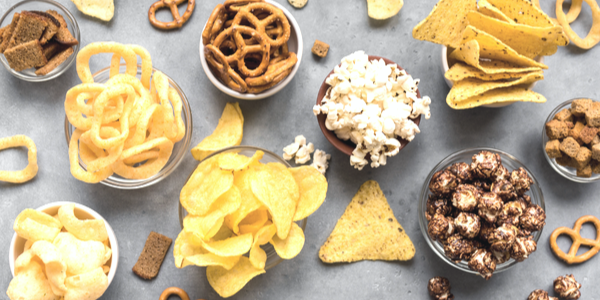
Nutrition labels can be tricky. Healthy "junk food" makes matters worse. "Bad" food pretending to be "good" makes it difficult to know if the nutrients are there.
Read on for a junk food list put together by our team of dietitians and nutrition experts. Plus, get 25 ideas for healthier substitutions!
List of 20 'Unhealthy' Foods
When trying to eat healthy, limiting salty deep-fried French fries and dark chocolate swirled ice cream is likely to follow. But not all food products are so clear choices.
Food companies use sneaky marketing tactics to disguise and hide unwanted ingredients and unneeded calories. The following list contains foods that are often thought to be healthy but are actually low in nutrients.
1. Microwave and "Skinny" Popcorn
Plain popcorn can be a wonderful, high-fiber snack. However, microwave popcorn can have dangerously high levels of added salt and even chemicals.
Pre-packaged popcorns can also be loaded with added ingredients such as drizzled chocolate or salt-heavy seasonings.
2. Pre-Made Smoothie Mixes and Kits
Smoothies are heralded as a health food, but ready-to-eat alternatives are not as healthy as one would think. Bottled and processed smoothies can contain added ingredients, such as preservatives, sugars, or sugar substitutes. These additions can be just as "bad" as the real thing.
3. Pretzels
Pretzels can be surprisingly unhealthy depending on their ingredients and how they are processed. Wheat varieties are often higher in nutrients but can still contain refined flour, added salt, and be virtually fiber-free.
4. Plant-Based Beverages and Burgers
Burgers and beverages that are absent of meat and made with plants can certainly be healthier options. However, many are bulked up with fillers that make them low in protein and high in preservatives. Be sure to check the label for additives and other unnecessary ingredients.
Rice and oat milks can also be incredibly high in added sugar and additives. It is important to not assume that these alternatives are inherently higher in nutrients due to being plant-based. Whether from a plant or animal, looking at the label is a key practice in healthy eating patterns.
5. Instant Oatmeal
From flavored varieties to other options, instant oatmeal can be as easy as it is unhealthy. Plain varieties can be a great source of fiber and protein, but flavored packets can contain excessive additives and sugar.
6. Pre-Packaged Lunch Meats
Processed meat, such as packaged turkey, can contain carcinogens (cancer-causing compounds). While processed meat guidelines are everchanging, one thing is clear: prepacked meats tend to be loaded with sodium and other dangerous additives that preserve the meat until it is eaten.
Overall, it is best to look for low-sodium slices or opt for fresh-cut deli slices.
7. Granola
High levels of added sugar can be shrouded under names like "syrup", "invert sugar", or "nectars". Just because granola contains components of healthy eating such as nuts and seeds, that does not make it automatically healthy.
When loaded with chocolate or laden with sugars, granola is far from great for weight management.
8. Protein, Energy, and Meal Replacement Bars
Similar to granola, protein, and energy bars are one of the worst culprits in terms of counterfeit "healthy" food. While they look like a healthy option, meal replacement bars can contain ingredients and high calories akin to a candy bar.
Look for options with real, minimal ingredients, such as foods you know and recognize and natural sweeteners like dates. Also, look for a bar with an average of 15 grams of protein for a snack and 25 grams for a meal replacement.
9. Flavored Yogurt
Yogurt can sound like a healthy, nutrient-rich snack packed, just be sure to check the label.
Many flavored yogurts contain as much or even more sugar than a serving of dessert. The desirable protein content goes out the window when there are too many additives.
10. Trail Mix
Full of chocolate chips and candies or high in fat or salt content, some trail-mixes hardly provide useful fuel for the day's activities.
Whether the day involves hiking trails or trailblazing between meetings and appointments, the healthiest option is typically a homemade mix.
11. Veggie-Based Chips
While assumed better than processed potato chips, vegetable-based chips and snacks are often composed mostly of corn and potatoes. High saturated fat makes veggie-based alternatives nothing like the vegetables they claim to resemble.
Real veggies are the best bet for getting the full spectrum of nutrients without the added salt or starch.
12. Pre-Packaged Salads
Salads have long been thought of as a health food. However, pre-packaged versions can be as unhealthy as their alternatives, especially when loaded with fat-filled dressings.
Pre-made kits and mixes can be covered completely in preservatives to prevent spoilage, only to spoil the overall nutritional value.
13. Individual Flavored Applesauce
Applesauce cups and squeeze pouches have been a popular pick among parents and children alike.
Unfortunately, pre-portioned applesauce can be filled with artificial flavors and added sugars. Lookout for high-fructose corn syrup as a major ingredient.
14. Turkey Bacon
While many pick turkey bacon for weight loss, what they do not know is that it could be hindering their health. Turkey bacon can be healthier than pork but still excessive in salt and saturated fats.
If regularly consumed over time, this can contribute to obesity and heart disease.
15. Dried Fruit and Fruit Juice
Fruits contain plenty of natural sugars and are nutrient-rich. Dried fruits can contain added sugar levels that make them an obsolete option when it comes to choosing healthy foods. Banana chips can even be fried instead of dried, making even one-ounce equivalent to 150 calories.
Juices made from concentrate can also be bad news. Companies can use sugar during the processing process without including it on the nutrition label. Try and find juices made with 100% juice as their only ingredient.
16. Multigrain or Wheat Bread
A sneaky source of refined grains, "wheat" bread and multigrain products can be stealthy kinds of calories. Bread is even dyed brown in some cases to mislead shoppers into thinking they have found a healthy option.
Multigrain, wheat, and phrases like "7 grain" simply mean that more than one grain has been used. Be aware of words that indicate processing on the ingredients list. These include key phrases such as "bleached" or "unbleached enriched wheat flour".
17. Coconut or Nutrition Waters
Anything with water as the main ingredient may seem harmless, but sugar-laden "nutrient waters" can contain lurking liquid additives. Claiming energy-boosting vitamin powers, these beverages may provide some nutrition but are not considered nutrient-rich. Many are overloaded with sweeteners and dyes to mask the natural qualities of the nutrients.
18. Reduced-Fat Versions of Food
Healthy fats are a much-needed ingredient in the human diet. Most companies miss the mark on this, however, when marketing "fat-free" or "reduced-fat" alternatives.
Instead of fat, they fill their product with increased levels of salt, sugar, or filler foods. This is to replace regular fatty ingredients in their recipes.
19. Rice Crackers and Cakes
Rice cakes are practically the symbol of dieting and healthy eating. However, they go past cliché when they are made with refined rice and are around 80 percent carbohydrate.
While carbs are a part of a well-balanced diet, it is important to diversify the sources it comes in. Rice cakes can be pretty plainly nutrient-poor!
20. Sushi
Sushi can be a source of high sodium even though it appears to be green and full of vegetables. Varieties that are topped with mayo, cream cheese, or fried can cause blood sugar spikes.
Add in refined rice and the sodium of soy sauce, and the veggies are outnumbered by nutrient-poor additions.
25 Healthier Substitutions
With a little extra time set aside to invest in healthy habits, many store-bought conveniences can be homemade. Here are a few ideas to include in a balanced menu rotation.
Healthier Homemade
1. Trail mix
2. Granola
3. Nut milk
4. Vegetable chips
5. Meal-prep salad mixes and kits
6. Bean-based burgers
7. Energy or protein "bites", bars, or balls
8. Condiments, sauces, and dressings
9. Seasoning blends
Still interested in store-bought food items? Find these healthier varieties when going for groceries.
Look for Unsweetened or Plain Varieties
10. Coconut milk and water
11. Greek yogurt
12. Instant oatmeal
13. Applesauce
14. Dried fruit
Opt for Whole Foods
15. Fresh fruits
16. Vegetables, especially the non-starchy types (i.e. cauliflower and broccoli) and starchy (i.e. sweet potatoes) in moderation)
17. Lean proteins
18. Legumes and legume-based snacks (i.e. roasted chickpeas)
Choose Alternatives with Minimal Ingredients
19. Protein, energy, or meal replacement bars
20. Fruit juices and smoothies
Use Natural Sweeteners
21. Honey
22. Berries
23. Banana
Healthy Fats
24. Avocados
25. Vegetable oils
26. Nut butters
The Bottom Line
Whether to honor a sweet tooth or intense crunchy craving, it is okay (and even encouraged) to enjoy those "bad" foods occasionally. In fact, an intense restriction can lead to bouts of binge eating behaviors and create a negative relationship with food.
However, it is important to place an emphasis on whole foods first. As a general rule, place an emphasis on whole foods such as plant-based products, lean meats, and healthy fats. Also, limit fast food runs and aim to make nourishing meals at home.
References:
Everyday Health Group. 11 Not-So-Healthy 'Health' Foods. Everyday Health. https://www.everydayhealth.com/diet-nutrition-pictures/not-so-healthy-health-foods.aspx.
Gelman L. 17 Surprisingly Unhealthy Foods You Might Want to Avoid. Published October 22, 2019. https://www.thehealthy.com/nutrition/unhealthy-foods/.
Nazish N. 10 'Healthy' Foods That Are Actually Bad For You. Forbes. Published March 30, 2019. https://www.forbes.com/sites/nomanazish/2019/03/30/10-healthy-foods-that-are-actually-bad-for-you/?sh=2879e4d21aa6.







